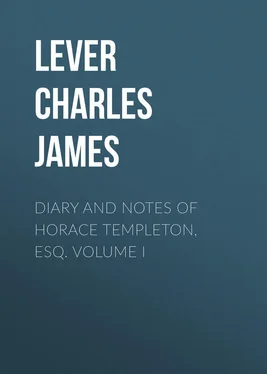Charles Lever - Diary And Notes Of Horace Templeton, Esq. Volume I
Здесь есть возможность читать онлайн «Charles Lever - Diary And Notes Of Horace Templeton, Esq. Volume I» — ознакомительный отрывок электронной книги совершенно бесплатно, а после прочтения отрывка купить полную версию. В некоторых случаях можно слушать аудио, скачать через торрент в формате fb2 и присутствует краткое содержание. Жанр: literature_19, foreign_antique, foreign_prose, на английском языке. Описание произведения, (предисловие) а так же отзывы посетителей доступны на портале библиотеки ЛибКат.
- Название:Diary And Notes Of Horace Templeton, Esq. Volume I
- Автор:
- Жанр:
- Год:неизвестен
- ISBN:нет данных
- Рейтинг книги:4 / 5. Голосов: 1
-
Избранное:Добавить в избранное
- Отзывы:
-
Ваша оценка:
- 80
- 1
- 2
- 3
- 4
- 5
Diary And Notes Of Horace Templeton, Esq. Volume I: краткое содержание, описание и аннотация
Предлагаем к чтению аннотацию, описание, краткое содержание или предисловие (зависит от того, что написал сам автор книги «Diary And Notes Of Horace Templeton, Esq. Volume I»). Если вы не нашли необходимую информацию о книге — напишите в комментариях, мы постараемся отыскать её.
Diary And Notes Of Horace Templeton, Esq. Volume I — читать онлайн ознакомительный отрывок
Ниже представлен текст книги, разбитый по страницам. Система сохранения места последней прочитанной страницы, позволяет с удобством читать онлайн бесплатно книгу «Diary And Notes Of Horace Templeton, Esq. Volume I», без необходимости каждый раз заново искать на чём Вы остановились. Поставьте закладку, и сможете в любой момент перейти на страницу, на которой закончили чтение.
Интервал:
Закладка:
Poor Chateaubriand! the man who never varied, the man that was humblest before his rightful sovereign, and prouder than the proudest Marshal in presence of the Emperor, how completely forgotten is he – standing like some ruined sign-post to point the way over a road no longer travelled! A more complete revolution was never worked in the social condition of a great kingdom than has taken place in France since the time of the Emperor. The glorious career of conquering armies had invested the soldier’s life with a species of chivalry, that brought back the old days of feudalism again. Now, it is the bourgeoisie are uppermost. Trade and money-getting, railroads and mines, have seized hold of the nation’s heart; and where the bâton of a Maréchal was once the most coveted of all earthly distinctions, a good bargain on the Bourse, or a successful transaction in scrip, are now the highest triumphs. The very telegraph, whose giant limbs only swayed to speak of victories, now beckons to an expectant crowd the rates of exchange from London to Livorno, and with a far greater certainty of stirring the spirits it addresses.
I fell into all this moody reflection from thinking of an incident – I might almost call it story – I remembered hearing from an old cuirassier officer some years ago. I was passing through the north of France, and stopped to dine at Sedan, where a French cavalry regiment, three thousand strong, were quartered. Some repairs that were necessary to my carriage detained me till the next day; and as I strolled along the shady boulevards in the evening, I met an old soldier-like person, beside whom I dined at the table-d’hôte. He was the very type of a chef-d’escadron of the Empire, and such he really proved to be.
After a short preamble of the ordinary commonplaces, we began to talk of the service in which he lived, and I confess it was with a feeling of surprise I heard him say that the old soldiers of the Empire had met but little favour from the new dynasty; and I could not help observing that this was not the impression made upon us in England, but that we inclined to think it was the especial policy of the present reign to conciliate the affections of the nation by a graceful acknowledgment of those so instrumental to its glory.
“Is not Soult as high, or rather, is he not far higher, in the favour of his sovereign, Louis Philippe, than ever he was in that of the Emperor? Is not Moncey a man nobly pensioned as Captain of the Invalides?”
“All true! But where are the hundreds – I had almost said thousands, but that death has been so busy in these tranquil times with those it had spared in more eventful days – where are they, the old soldiers, who served in inferior grades, the men whose promotions for the hard fighting at Montereau and Chalons needed but a few days more of prosperity to have confirmed, but who saw their best hopes decline as the sun of the Emperor’s glory descended?
“What rewards were given even to many of the more distinguished, but whose principles were known to be little in accordance with the new order of things? What of Pajol, who captured a Dutch fleet with his cavalry squadrons; – ay! charged the three-deckers as they lay ice-locked in the Scheldt, dismounted half of his force and boarded them, as in a sea-fight? Poor Pajol! he died the other day, at eighty-three or four, followed to the grave by the comrades he had fought and marched beside, but with no honours to his memory from the King or his government. No, sir, believe me, the present people never liked the Buonapartists; the sad contrasts presented by all their attempts at military renown with those glorious spectacles of the Empire were little flattering to them.”
“Then you evidently think Soult and some others owe their present favour, less to the eminence of their services than to the plasticity of their principles?”
“Who ever thought Soult a great general?” said he, abruptly answering my question by this transition. “A great military organizer, certainly – the best head for the administration of an army, or the Emperor’s staff – but nothing more. His capacity as a tactician was always third rate.”
I could not help acknowledging that such was the opinion of our own great captain, who has avowed that he regarded Massena as the most accomplished and scientific general to whom he was ever opposed.
“And Massena’s daughter,” cried the veteran indignantly, “lives now in the humblest poverty – the wife of a very poor man, who cultivates a little garden near Brussels, where femmes de chambre are sent to buy bouquets for their mistresses! The daughter of a Maréchal de France , a title once that Kings loved to add to their royalty, as men love to ennoble station by evidences of high personal desert!”
“How little fidelity, however, did these men shew to him who had made them thus great! how numerous were the desertions! – how rapid too!”
“Yes, there was an epidemic of treason at that time in France, just as you have seen at different epochs, here, other epidemics prevail: in the Revolution the passion was for the guillotine; then came the lust of military glory – that suited us best, and lasted longest; we indulged in it for twenty years: then succeeded that terrible revulsion, and men hastened to prove how false-hearted they could be. Then came the Restoration – and the passion was to be Catholic; and now we have another order of things, whose worst feature is, that there is no prevailing creed. Men live for the day and the hour. The King’s health – the state of Spain – a bad harvest – an awkward dispute between the commander of our squadron in the Pacific with some of your admirals, – anything may overturn the balance, and our whole political and social condition may have to be built up once more.”
“The great remedy against this uncertainty is out of your power,” said I: “you abolished the claims of Sovereignty on the permanent affection of the people, and now you begin to feel the want of ‘Loyalty.’”
“Our kings had ceased to merit the respect of the nation when they lost it.”
“Say, rather, you revenged upon them the faults and vices of their more depraved, but bolder, ancestors. You made the timid Louis XVI. pay for the hardy Louis XIV. Had that unhappy monarch but been like the Emperor, his court might have displayed all the excesses of the regency twice told, and you had never declared against them.”
“That may be true; but you evidently do not – I doubt, indeed, if any but a Frenchman and a soldier can – feel the nature of our attachment to the Emperor. It was something in which personal interest partook a large part, and the hope of future advancement, through him , bore its share. The army regarded him thus, and never forgave him perfectly, for preferring to be an Emperor rather than a General. Now, the very desertions you have lately alluded to, would probably never have occurred if the leader had not merged into the monarch.
“There was a fascination, a spirit of infatuating ecstasy, in serving one whose steps had so often led to glory, that filled a man’s entire heart. One learned to feel, that the rays of his own splendid achievements shed a lustre on all around him and each had his portion of undying fame. This feeling, as it became general, grew into a kind of superstition, and even to a man’s own conscience it served to excuse many grave errors, and some direct breaches of true faith.”
“Then, probably, you regard Ney’s conduct in this light?” said I.
“I know it was of this nature,” replied he, vehemently. “Ney, like many others, meant to be faithful to the Bourbons when he took the command. He had no thought of treachery in his mind; he believed he was marching against an enemy until he actually saw the Emperor, and then – ”
Читать дальшеИнтервал:
Закладка:
Похожие книги на «Diary And Notes Of Horace Templeton, Esq. Volume I»
Представляем Вашему вниманию похожие книги на «Diary And Notes Of Horace Templeton, Esq. Volume I» списком для выбора. Мы отобрали схожую по названию и смыслу литературу в надежде предоставить читателям больше вариантов отыскать новые, интересные, ещё непрочитанные произведения.
Обсуждение, отзывы о книге «Diary And Notes Of Horace Templeton, Esq. Volume I» и просто собственные мнения читателей. Оставьте ваши комментарии, напишите, что Вы думаете о произведении, его смысле или главных героях. Укажите что конкретно понравилось, а что нет, и почему Вы так считаете.












